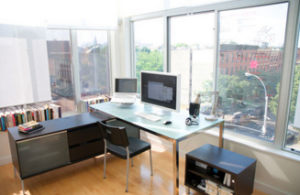Seasonal Affective Disorder as mentioned in one of my earlier blogs causes symptoms in the winter that many just don’t like to feel. Antidepressants are used, and you fight until the long winter is finally over. As we sit in dorm rooms, with our blinds closed most of the time, we don’t feel that sun coming through the window. But, What about artificial light? Does it serve more benefits to you than natural light?
In Study 1, According to Christopher Bergland, researchers at the Interdepartmental Neuroscience program at Northwestern University in Chicago reported that the detrimental impact of being in a windowless environment is a universal phenomenon. According to a new study titled “Impact of Workplace Daylight Exposure on Sleep, Physical Activity, and Quality of Life,” concluded there is a strong relationship between workplace daylight exposure and office workers’ sleep, activity, and quality of life. The study group was comprised of 49 day-shift office workers-27 in windowless workplaces and 22 in workplaces with windows.
 The study found that compared to workers in office without windows, those with windows in the workplace received 173 percent more white light exposure during work hours and slept an average of 46 more minutes per night. Workers without windows had lower scores, and had poorer outcomes in measures of overall sleep quality, sleep efficiency, sleep disturbances and daytime dysfunction.
The study found that compared to workers in office without windows, those with windows in the workplace received 173 percent more white light exposure during work hours and slept an average of 46 more minutes per night. Workers without windows had lower scores, and had poorer outcomes in measures of overall sleep quality, sleep efficiency, sleep disturbances and daytime dysfunction.
Therefore, in this study it concluded that natural light was better than having no  light at all.
light at all.
However, Study 2 took a different approach. After several years of research correlated weight gain with artificial light exposure. Researcher Kooijman and his team wanted to know more about what exactly caused this correlation, so they decided to look at the mechanism behind the weight gain. The researchers used mice for the study and exposed them to artificial light for 12, 16, or 24 hours for five weeks.
Kooijman and his research team came to the conclusion that mice exposed to the artificial light for 24 hours, compared to 12 hours had significantly higher fat composition despite consuming the exact same diet. A tissue called brown adipose tissues (BAT) plays a key role in energy expenditure by burning calories. The BAT activity was decreased by light exposure in this experiment. As mice were exposed to longer periods of light, conversion of fatty acids and glucose into heat was reduced, and the longer the light shined the more the fewer calories the mice burned.
It seemed weird to me that this study could reflect on humans, but the body’s circadian rhythms are uniquely attuned to variations in light and dark and disruption of the processes can have astonishing metabolic repercussions. This study definitely shows that maybe artificial light isn’t the way to go. Now, if working in a hospital all the time, one often confuses their body and causes the processes to slow down, so sometimes it can be hard to control in certain situations.
Between the two study’s, it seems that natural light provided better benefits for the human body. It didn’t slow down natural system processes, it helped sleep, helped activity and quality of life. However, in the study with the mice, there could always be third variables involved, which caused the results. But it is interesting to see how both types of light could have different effects on us as humans, no matter where you are in the workplace, in a cubicle, or at a hospital.
Overall, it would be interesting if there were a study done to see if there is a correlation between natural sunlight and the human body vs. artificial light. It would be interesting to see the findings between the two, and to see if there is any more mechanism’s behind what is actually going on with the human body when it comes to artificial and natural light.


We usually don’t think about how light exposure effects us. We were never taught that we should get the proper amount of “sunlight” everyday. Sure our parents wanted us to go outside and play, but I don’t think light was the reason. After reading this blog, I think that it is important that we get sunlight every day. As college students, I think that walking outside to class every day should be enough. I definitely do not think that artificial light could be as beneficial as natural light, but I agree that they should do a study on this. This article explains why we need sunlight. Obviously it would be unethical to place someone in a room with no light at all to see if we need it, but we can go through the “thought experiment” like this website says. We can make predictions. I also think that one of the main reasons we need sunlight is for the vitamin D. It is interesting to think about living in a world with mo light, and I hope we never have to live like that.